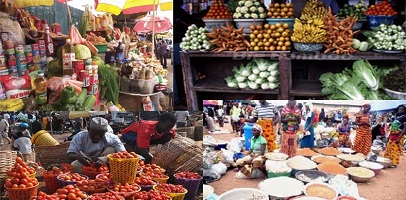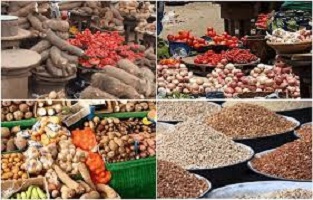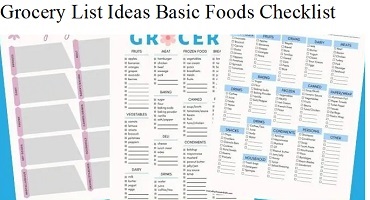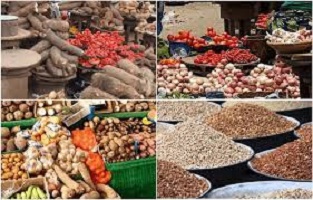Prices of Foodstuffs in Nigerian Market as of April 2023
Prices of Foodstuffs in Nigerian Market as at April 2023

- Prices of Food Commodities in Nigeria 2023
- Foodstuff Prices in Nigeria Today 1st April 2023
- Food prices continue to rise in Nigeria
- Commodities: Price list of Foodstuffs in Nigeria April 2023
Related Articles Trending Right Now!
- https://9jafoods.com/200-nigerian-food-stuff-nigeria-foodstuff-prices-list-of-ingredients/
- https://9jafoods.com/prices-of-foodstuffs-in-nigeria-march-2023/
- https://9jafoods.com/foodstuff-list-food-ingredients-in-nigeria-50-top-list/
- https://9jafoods.com/100-top-foodstuff-shopping-list-food-ingredients-in-nigeria/
- https://9jafoods.com/foods-checklist-foodstuffs-price-in-nigeria/
- https://9jafoods.com/foodstuff-market-price-list-in-nigeria-as-at-september-2021/
- https://9jafoods.com/food-price-list-in-nigeria-2022/
- https://9jafoods.com/food-cost-prices-of-foodstuffs-in-nigeria-may-2022/
- https://9jafoods.com/grocery-shopping-list-nigerian-list-of-grocery-provision-items/
Prices of Foodstuffs in Nigerian Market as at April 2023 ~ an Overview
Do you want to know how much food costs in Nigeria? Do you know 72 hours before Nigeria’s 2023 presidential election, food prices skyrocketed?
According to the National Bureau of Statistics, or NBS, February saw price increases for foods like yam, rice, and beef.
This is stated in the February 2023 NBS Selected Food Prices Watch Report, which was published in Abuja.
According to the report, the average cost of 1 kg of boneless beef increased annually by 27.43%, from N1, 922.2 in February 2022 to N2, 445.96 in February 2023.
“From N2, 418.91 recorded in January 2023, 1 kg of boneless beef increased by 1.12% monthly.”
Prices of Foodstuffs in Nigerian Market
According to the report, the average cost of 1 kg of rice (local, sold loose) increased annually by 19.30%, from N436.58 in February 2022 to N520.84 in February 2023
The average price of this item increased by 1.17% month over month from N514.83 in January 2023
According to the report, the average price of a kilogram of tomatoes increased annually by 19.08%, from N393.08 in February 2022 to N468.09 in February 2023
In February 2023, the price of 1 kg of tomatoes increased by 0.22% monthly.
According to the NBS, the average cost of a bottle of vegetable oil in February 2023 was N1, 196.68, up 25.91% from the N950.46 recorded in February 2022.
Prices of Foodstuffs in Nigerian Market
According to the report, the average cost of a kilogram of yam tubers increased by 28.45% on an annual basis, from N339.76 in February 2022 to N436.41 in February 2023.
1kg of yam tubers increased by 1.17% from N431.36 in January 2023 monthly.
Similarly to that, it claimed that the average price of a kilogram of onion bulbs increased by 18.99% annually, from N378.26 in February 2022 to N450.07 in February 2023.
While the price increased by 2.41 percent month over month.
One of the lowest prices ever recorded was 0.00/kg.
Prices of Foodstuffs in Nigerian Market
According to the report, Adamawa reported the lowest average price for a 1 kg onion bulb at N194.44, while Cross River recorded the highest average price at N1,058.61.
According to the report, Benue had the lowest price for a bottle of vegetable oil at N71.00 and Abia had the highest price at N1,615.24.
A zone-by-zone analysis revealed that the South-South and South-East had higher average tomato prices, at N812.55 and N649.03, respectively, while the North-East had the lowest, at N232.78.
According to the report, the South-South and South-West both had the highest average prices for 1 kg of locally produced, loose rice, at N599.29 and N599.12, respectively.
The North-West had the lowest price, which was N451.70.
NAN
Other Prices of Foodstuffs in Nigerian Market as at April 2023
No matter who you are or what you are doing, we all love food as a necessity and need to know the price of foodstuff
However, the cost of food in Nigeria is different from that in other nations, particularly if you are a newcomer and are curious about the cost of food.
Not to worry, I’ve got you covered in this post. Let’s get started.
The cost of food varies depending on where it is purchased, so the same food item may be more affordable in some locations while being more expensive in others.
It is crucial to be aware of this fact so that you are ready for any price changes you may experience when you visit the market.
Prices of Foodstuffs in Nigerian Market as at April 2023
Discover reliable and current information on everything you need to know about the costs of food commodities. As of this month, April 2023, in Nigeria
Food is a necessity, not a desire, and it serves as fuel for the body because it is so important to maintaining a person’s health and functioning.
We need food to be able to go about our daily activities without difficulty, just like a car needs fuel to run.
Food is necessary for survival, and animals in addition to humans need it. Because going without food can harm one’s health, it is important to eat the right amount of food each day to maintain good health.
Food is very important, and a typical man’s basic need is to fill his stomach before considering anything else.
Eating food is the top concern of the populace in Nigeria, and when it is difficult to obtain, unpleasant outcomes occur.
Prices of Foodstuffs in Nigerian Market
Food is a basic necessity for all people, and having it available in large quantities and at an affordable price will make a country happy.
For one to be properly prepared when going shopping, one must be aware of the prices of food commodities in Nigeria because they vary greatly depending on the brand, quality, and type.
In Nigeria, staple foods like rice, beans, garri, yams, spaghetti, plantains, and potatoes are all common. Because these are the typical foods consumed by the majority of Nigerian households, they are in high demand.
This article’s goal is to inform readers about the current market prices for food commodities so they can shop with knowledge of what items will cost.
Foodstuffs Shopping List in Nigeria 2023
- Rice
- Beans
- Potato
- Yam
- Plantain
- Banana
- Red Meat
- Chicken
- Snail Meat
- Crayfish
- Prawn
- Pepper
- Salt
- Vegetables (Ugu)
- Onions
- Fish
- Vegetable oil (Palm, groundnut, coconut oil, etc)
- Egusi
- Ogbono
- Ewedu (Yoruba Soup)
- Salad (Garbage, Carrot, Cucumber, etc)
- Tomato
- Spices
- Achi and Ofo (Igbo soup)
- Garri
- Semo
- Stock Fish
- Noodles
Price of (General) Foodstuff in Nigeria 2023

Find below the list of some general foodstuff in Nigeria and their prices.
- 50kg of Rice (A Bag of Rice): ₦17,500-₦23,000
- 25kg of Rice: ₦7000-₦8500
- 5kg of Rice: ₦2500-₦3000
- 5kg of Rice: ₦1200-₦1600
- 50Kg Oloyin Beans: ₦30,000 –₦39,000
- 25Kg Oloyin Beans: ₦15,000 – ₦19,000
- 50Kg Olotun Beans: ₦29,000 – ₦36,000
- 25Kg Olotun Beans: ₦14,000 – ₦17,500
- Butter Beans: ₦33,000
- 25KG Butter Beans: ₦16,500
- 50Kg White Beans: ₦32,000
- Brown Beans (50kg): N32,000
- Tomato (1kg): ₦200-₦500
- Sweet Potato (1kg): ₦3000-₦800
- Onion (1kg): ₦250-₦500
- Lettuce (1 head): ₦200-₦400
- Yam (A tuber of yam): ₦700-₦1000
- Bag of Ijebu Garri (80kg): ₦10,500
- Bag of White Garri (50kg) ₦6,500 – ₦7,500
- Bag of Yellow Garri (50kg) ₦6,500 – ₦7,500
- Sweet Potato (Big Basket): ₦500 – ₦650
- Sweet Potato (Small Basket): ₦300 – ₦400
- Melon Seed (Egusi): ₦200- ₦250
- Ogbono Seed: ₦200- ₦300
- Okro: ₦50-₦1000
- Coco Yam: ₦300- ₦1000
- Groundnut (Fresh 1 Bag): ₦5,000- ₦6,000
- Groundnut (Fried 1 Bottle): ₦500- ₦600
- Spaghetti: ₦200- ₦300 (All Brands)
- 1 Carton of Indomie Chicken ( 40pcs): ₦1,900 – ₦2,100
- 1 Carton of Indomie Onion (40pcs): ₦2,100 – ₦2,200
- 1 Carton of indomie superpack (40ps):: ₦3,300- N3,400
- 1 Carton of Indomie Hungry Man (24ps)- ₦4,300- ₦4,500
- 1 Carton of indomiebelleful (16ps)- ₦4,300- ₦4,500
- 1 Carton of Chiki Noodles (40pcs) – ₦3,000- ₦3,200
- 1 Carton of Golden Penny Noodles (40ps): ₦2,200
- Pasta (Macaroni): ₦200-₦250
- Starch: Tied in Nylons according to the Quantity required
- Golden Penny Semovita: ₦400- ₦3,500 (Depending on the Size)
- Honeywell Semolina: ₦350- ₦4,000 (Depending on the Size)
- Golden Penny Semolina: ₦350- ₦4,500 (Depending on the Size)
- Honeywell Semolina: ₦400- ₦5,000 (Depending on the Size)
- Poundo Yam: ₦500- ₦5,000
- Yam Flour: ₦300 Upwards (According to Required Quantity)
- Plantain Flour: ₦300 Upwards (According to Quantity Required)
- Flour: ₦300- ₦3,500
- Palm Oil (5 ltrs): ₦2,200- ₦2,500
- Palm Oil (20 ltrs): ₦8,800- ₦9,000
- Palm Oil (30 ltrs): ₦12,800- ₦13,000
- Vegetable Oil Local (5 ltrs): ₦2,300- ₦2,500
- Vegetable Oil (20 ltrs): ₦9,000- ₦9,500
- Vegetable Oil (30 ltrs): ₦13,500 –₦14,000
- Kings Vegetable Oil (5 ltrs): ₦2,900- ₦3,000
- Wesson Vegetable Oil (5 ltrs): ₦4,500 – ₦4,700
- Mamador Vegetable Oil (3.8 ltrs): – ₦3,000 – ₦3,200
- Power Vegetable Oil (3 ltrs): ₦2,400- ₦2,600
- A bag of Yellow Maize: ₦16,000- ₦18,000
- A Bag of White Maize: ₦15,500-₦18,000.
- Cassava Flour: ₦1,500 Upwards (According to Quantity Required)
- Canned Fish (Sardines & Titus Brands): ₦400
Spices cost ~ Price of Spices in Nigeria
The African kitchen uses a variety of spices to create sweet treats.
Any food prepared without these spices will taste bland. This means that in addition to their nutritional value, spices also give food flavor.
Here is a list of prices for some common spices that are required to make a basic Nigerian dish.
- Maggi (Sachet): ₦500-₦550
- Knorr (Sachet): ₦500-₦550
- Grinned Pepper: ₦300- ₦1000
- Black Pepper: ₦300- ₦400
- Chili Pepper: ₦100- ₦1000 (Depending on Quantity Needed)
- Thyme: ₦120- ₦200
- Curry: ₦120- ₦200
- Powder Ginger: ₦80- ₦120
- Powder Garlic: ₦50- ₦100
- Potash (Akanwu): ₦20-₦50
- Locust Beans (Dawa-Dawa): ₦100- ₦1000 (Depending on Quantity Needed)
- Annapurna Salt: ₦50-₦100
- Chef Salt: ₦50- ₦100
- Dangote Salt: ₦70- ₦150
- Nutmeg: ₦20- ₦100
Some of these spices are of high nutritional value.
For example, black pepper has been proven to enhance weight loss, ease digestion, prevent cancer, and battle colds and coughs.
The common curry leaf has also been shown to aid reduce blood cholesterol levels and lower blood sugar levels.
Prices of Perishables & Vegetables in Nigeria
- Fresh Tomatoes: ₦100 Upwards (According to Quantity Needed)
- Cabbage: ₦100
- Onion: ₦50 Upwards (According to Quantity Needed)
- Carrots: ₦50 Upwards (According to Quantity Needed)
- Green Peas: ₦100
- Spring Onion: ₦200
- Sweet Potato: ₦200- ₦400
- Irish Potato: ₦200- ₦500
- French Peas: ₦50
- Fresh Pepper: ₦100 Upwards (According to Quantity Needed)
- Water Leaf: ₦50- ₦100
- Pumpkin leaf (Ugwu): ₦50- ₦100
- Bitter Leaf: ₦20- ₦100
- Spinach (Green): ₦100- ₦300
- Curry Leaf: ₦50 – ₦100
- Scent Leaf (Eferin): ₦50- ₦100
- Pepper Soup Spices (Powder): ₦200- ₦500
Prices of Fish and Meat in Nigeria
In Nigeria, beef is the most popular type of meat. According to some estimates, Nigeria alone consumes more than 80,000 cows. Goats, ram, and other types of meat are also sold on the market.
White meats like chicken and turkey, on the other hand, are also widely consumed. Nigerian cuisine is so distinctive that some dishes require a particular type of meat to be prepared.
For instance, a lot of fish is cooked with beef or goat meat in egusi. While rice stews with sauce are typically made with chicken or turkey. There is always the appropriate meat or fish to season whatever you are eating.
- Stockfish: ₦120- ₦500
- Tilapia: ₦600- ₦1500
- Catfish: ₦1000- ₦3000 (Depending on the Size)
- Croaker: ₦1000- ₦3,000
- Titus: ₦500
- Beef: ₦300 Upwards (According to Quantity Needed)
- Goat Meat: ₦500 Upwards (According to Quantity Needed)
- Kpomo (Cow Skin): ₦500 Upwards (According to Quantity Needed)
- Assorted (Intestine, Liver, Kidney, Stomach skin): ₦500 Upwards (According to Quantity Needed)
- Chicken (1Kg): ₦1,200
- Chicken (0.5Kg): ₦600
- Turkey (1Kg): ₦1400
- Turkey (0.5kg): ₦650
- Gizzard: ₦300- ₦1000
- Cray Fish: ₦50- ₦1000
- Prawn: ₦50- ₦500
- Ram Meat: ₦500- ₦5,000
- Snail: ₦500-₦800
Price of Drinks, Dairy, and Beverages in Nigeria
In Nigeria, the cost of beverages is fairly constant throughout the entire nation. Drinks are now so pricey that they are sometimes only accessible to the wealthy.
However, to make their products more affordable for the average person, businesses have done everything in their power to produce them in sachet sizes.
All manufacturers’ sachets range in price from 50 to 100 on average. The larger sizes are the ones you can see below.
I also included dairy products and beverages, particularly well-known ones. The soft drink industry is extremely competitive, and as a result, every company has set its price tag at the same level.
- 400g Powdered Tin Peak Milk: ₦1,150- ₦1,300
- 900g Powdered Tin Peak Milk: N1,850-₦2,200
- 500g Refill Powdered Peak Milk: ₦950- ₦1,200
- 380g Refill Powdered Three Crowns Milk: ₦800- ₦1,000
- 400g Powdered Tin Loya Milk: ₦800 – ₦1,000
- 400g Refill Powdered Loya Milk: ₦750- ₦900
- 500g Refill Milk Coast: ₦700 – ₦800
- 500g Powdered Tin Dano Milk: ₦900 – ₦1,000
- 900g Powdered Dano Milk: ₦1,650- ₦1,700
- 500g Refill Powdered Dano Milk: ₦800 – ₦1,000
- 500g Tin Milo: ₦1,000- ₦1,200
- 900g Tin Milo: ₦1,900 – ₦2,000
- 500g Cocoa Beverages Milo Refill 500g – N950 – N1, 000
- 500g Refill Bournvita: ₦850 – ₦950
- 500g Plastic Bournvita: ₦950 – ₦1,000
- 900g Plastic Bournvita: ₦1,600-₦1,800
- 500g Refill Ovaltine: ₦850- ₦950
- 500g Plastic Ovaltine: ₦900- ₦1000
- Coffee Nescafe Gold Blend: ₦1,600 – ₦1,800
- 50g Coffee Nescafe Classic: ₦550 – ₦600
- Dangote Sugar (50kg) – N17,000- N17, 300
- Sugar St. Louis Sugar (Cube 500g) – N350- N400
- Sugar Golden Penny Sugar (cube) 500g – N300- N400
- 1 Bottled water: ₦50
- 1 Carton of Bottled Water: ₦700
- Coca Cola (Plastic Coke): ₦1700- ₦1800
- Coca Cola (Fanta): ₦1100 -₦1300
- Bigi Apple: ₦900- ₦1100
- Bigi (Cola): ₦900- ₦1100
- Bigi Tropical: ₦900-₦1100
- Pepsi: ₦900- ₦1100
- 5-Alive Juice; ₦500
- Chi-Vita Juice: ₦350- ₦500
- Hollandia Yoghurt: ₦400- ₦500
- Caprisone: ₦100
- Bobo: ₦100
- Viju Milk: ₦150- ₦250
- Soya Milk: ₦150- ₦300
- Mayonnaise: ₦150- ₦500
- Butter:: ₦70- ₦500
- Bread: ₦80- ₦200
- Sliced Bread: ₦250- ₦500
- Egg (1 Crate): ₦750- ₦900
- Pap: ₦50- ₦200
- Custard: ₦200- ₦1500
Price of Fruits in Nigeria
Fruits are a crucial component of a healthy diet and lifestyle.
Fruits are typically not given much attention by people. A typical Nigerian in need feels that spending money on fruit is a waste.
Fruits have consistently shown the world their strength. They are incredibly abundant in a variety of vitamins that can fend off illnesses and diseases.
In addition, some fruits are used as ingredients in African dishes. Here is a price list for the most popular fruits that are sold in Nigeria;
- Coconut: ₦100-300
- Pineapple: ₦100-₦300
- Cucumber: ₦50- ₦100
- Banana: ₦200-₦500
- Paw-Paw: ₦150- ₦300
- Plantain: ₦300- ₦500
- Lemon: ₦50- ₦200
- Lime: ₦50- ₦100
- African Pear: ₦100- ₦400
- Avocado: ₦50- ₦150
- Apples (1kg): ₦1,000-₦1,200
- Cherry (Agbalumo): ₦50- ₦100
- Mango: ₦50- ₦100
- Guava: ₦50- ₦150
- Cashew: ₦100- ₦400
- Soursop: ₦400
- Tamarind: ₦500
- Tangerine: ₦100
- Grapefruits: ₦100
- Garden Egg: ₦50- ₦200
- Local Strawberry: ₦500
- Rose or water Apples: ₦500-₦700
- Tropical pepper: ₦50-₦100
- Wall-nut: ₦100-₦200
- Banana (1kg): ₦400-₦600
- Orange (1kg): ₦200-₦700
Factors Affecting the Price of Foodstuff in Nigeria Today
Food costs in Nigeria are constantly rising as a result of various factors.
Some packaged food producers attribute inflation to power supply costs because a large portion of them produce their electricity.
The manufacturers they purchase from and the expense of shipping the product to their warehouses are to blame, according to the distributors.
Food costs vary depending on the market, supermarket, store, and location you live in. While some markets are farther from the source of the food, others are closer.
It is often believed that foods like plantains and bananas are more affordable in southern states like Edo and Ondo while foods like rice, garri, beans, onions, tomatoes, and pepper are more affordable in the country’s north.
As a result, the prices may vary depending on where you live.
Where to Purchase Food in Nigeria
In Nigeria, markets are where one can buy food.
This is advised because purchasing it on your street may be more expensive than purchasing it in the main markets, especially if you intend to purchase it in bulk.
Additionally, you can order specific foods online from vendors on e-commerce sites like Konga and Jumia.
Frequently Asked Questions on Prices of Foodstuffs in Nigerian Market as at April 2023
How much does a bag of 100 kg beans cost in Nigeria?
Nigerian bean bag cost in 2023
Here is the cost of a bag of beans in Nigeria broken down by quantity and species.
100 kg. Of drum beans: 60,000–68,000. 50 kg of white beans ranges in price from 31,000 to 34,500.
In Nigeria, how much does a bag of iron beans cost?
₦78,549.00 per 100kg
Purchase 100 kg of white beans and iron from a reputable source at a discount.
How much is the rise in prices in Nigeria?
At 21.47% in November 2022, it increased. With 19.64%, the nation’s inflation rate reached a 17-year high in July. The trend is still upward.
The increase or decrease in prices across the board for a group of goods is used to calculate the inflation rate.
What is Nigeria’s food price index? What is the price index of food in Nigeria?
The Consumer Index Price of Food in Nigeria increased from the previous year and was 590.2 in December 2022.
The consumer price index is a metric that looks at changes in a currency’s purchasing power
What is the food quality index? What is the index of food quality?
The index compares the amounts of particular nutrients present in food to the quantities required by consumers.
A direct comparison is possible by using the same energy standard to compare human nutrient requirements and food composition.
What is index food?
The glycaemic index (GI): what is it? For foods containing carbohydrates, there is a rating system called the glycaemic index (GI). It demonstrates how quickly each food lowers your blood sugar (glucose) level when consumed alone.
How is the Nigerian consumer price index calculated?
To create a weighted measure of average price changes in the economy, the CPI is constructed using data from other surveys, economic theory, sampling, and other statistical techniques.
The weighting takes place to reflect the significance of the chosen commodities in the overall index.
How is the price index determined?
Take the price of the market basket for the interest-bearing year, divide it by the price of the market basket for the base year, and multiply the result by 100 to get the price index.
List of foodstuff to buy at home ~ what are the lists of food items?
Basic foods
- Baked goods.
- Dairy products.
- Edible plants.
- Legumes
- Edible fungi.
- Edible nuts and seeds.
- Cereals
- Meat
What are basic food items in Nigeria?
The Nigerian diet is dominated by starchy foods like yam, cassava, plantains, rice, and beans.
They are frequently eaten alongside an extensive selection of hearty soups and stews made with various cuts of meat and vegetables.
Vegetable stews are a favorite among Nigerians, who typically eat them several times per week.
What are Basic Food Items?
Contents
- Meat & Fish.
- Grains & Bread.
- Oil & Fat.
- Dairy & Eggs.
- Produce
- Tinned & Dried Produce.
- Condiments
List of raw food items in Nigeria ~ what are dry food items in Nigeria?
Dry foods crops like cocoa, dry Yam, Dry plantain, kola nut, bitter kola, dry crayfish, ground nut, semolina, ginger beer,
What are 5 traditional foods in Nigeria?
Nigerian Food: 8 Popular and Traditional Dishes to Try
- Jollof Rice.
- Iyan (Pounded Yam)
- Àmàlà (Yam Flour/ Cassava Flour/ Plantain Flour)
- Àkàrà (Fried Bean Cake)
- Pepper Soup.
- Ogbono Soup (African Mango Seed Soup)
- Puff-Puff (Fried Sweet Dough Ball)
- Suya (Spicy Grilled Kebab)
What are the 5 general food items?

The five food groups are Fruits, Vegetables, Grains, Protein Foods, and Dairy
Nigeria food prices ~ Is food expensive in Nigeria?
The cost of living in Nigeria is, on average, 58.7% lower than in the United States.
Cost of Living in Nigeria;
| Restaurants | Edit |
| Meal, Inexpensive Restaurant | 700.00₦ |
| Meal for 2 People, Mid-range Restaurant, Three-course | 15,000.00₦ |
| Mcmeal at mcdonalds (or Equivalent Combo Meal) | 2,500.00₦ |
| Domestic Beer (1-pint draught) | 400.00₦ |
Why is the cost of food so high in Nigeria? Why are food prices high in Nigeria?
The nation’s food insecurity problems have led to a sharp increase in food prices as a result of the significant decrease in food production.
Raw food stuff lists ~ what are the examples of food stuff?
All consumables, including sugar and sugar-sweetened confections, animal products, canned foods, snacks foods, bakery goods, prepared cereals, and condiments like salt, pepper, spices, cooking oil, and ketchup are included under the term “foodstuffs.”
What foodstuffs are essential in Nigeria? What are the basic food stuffs in Nigeria?
The Nigerian diet is dominated by starchy foods like yam, cassava, plantains, rice, and beans.
They are frequently eaten alongside an extensive selection of hearty soups and stews made with various cuts of meat and vegetables.
Vegetable stews are a favorite among Nigerians, who typically eat them several times per week.
List of foods in Nigeria – What are foodstuffs?
A substance with food value is referred to as food stuff. Food’s initial state, either before or after processing
What are the 7 food essentials according to the Nigerian food stuff list?
A balanced diet must contain the following seven components: carbohydrates, protein, fat, fiber, vitamins, minerals, and water.
What is the top ten food list? What is the first food list?
Any order can be used to introduce solid foods.
However, since they offer essential nutrients, puréed meats, poultry, beans, and iron-fortified cereals are advised as first foods, especially if your baby has been exclusively breastfed.
List of foods to sell – What can I offer for sale in a grocery store?
Carve a Niche
Choose from the following options: grains, food components, palm or groundnut oil, stock fish, tomatoes, peppers, onions, fruits, yams, potatoes, plantains, Garri, flour, confections, seasoning, frozen foods, spices, fufu, Kanda, pap, vegetables, and seafood. (crayfish, shrimps, fish, periwinkle, snails, etc)
Where to buy cheap foodstuff in Nigeria ~ where is food cheapest in Nigeria?
Yams and other staple foods are incredibly inexpensive in Niger State; in fact, Amala in Lagos is more affordable there.
Rice is one of the cheapest foods you can buy anywhere, including Kebbi State.
8 Nigerian Foodstuffs and Ingredients: A List of Foods to Sell
Ingredients
- Palm Oil. Palm oil is the major coloring agent for most Nigerian foods.
- Food Sweeteners/ Seasoning Cubes.
- Crayfish
- Yams – Nigerian Foodstuffs.
- Goat Meat – Nigerian foodstuffs.
- Dried Fish Picture.
- Egusi (Melon) Seeds.
- Ogbono Seeds Pictures.



